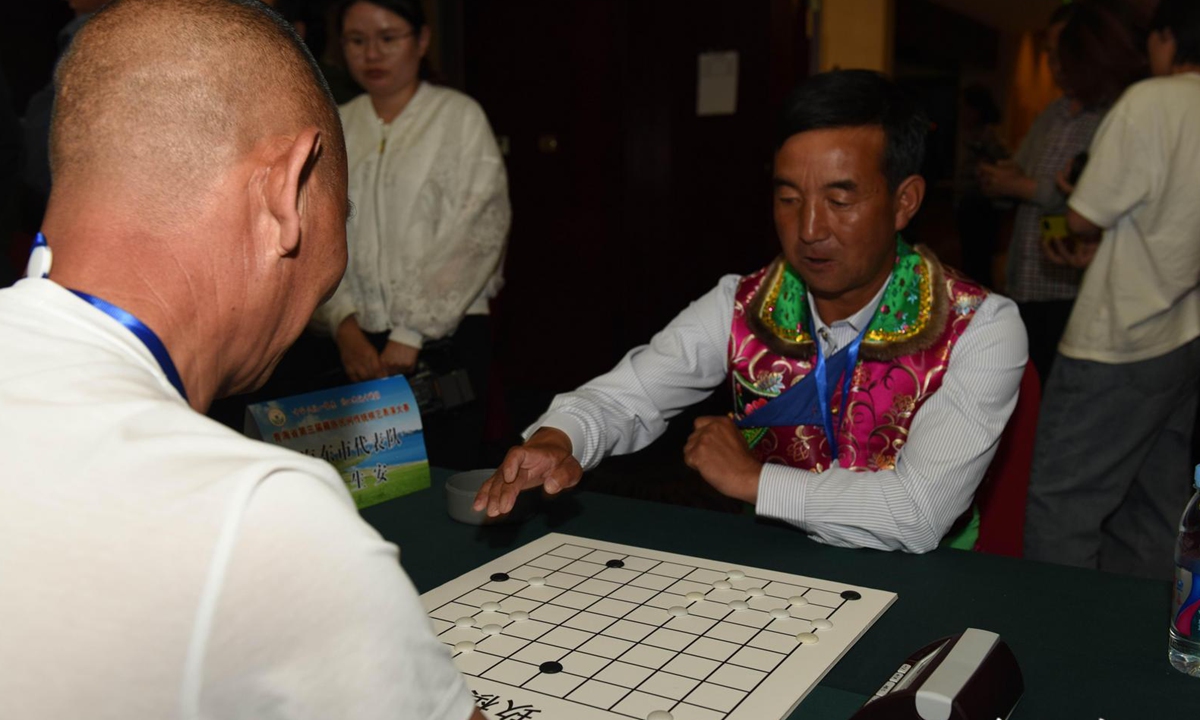Tibetan chess competition seeks to revitalize ancient cultural heritage
By Chen Xi Source: Global Times Published: 2020/8/30 19:08:40

Players are playing Tibetan chess. Photo: Snapshot of Qinghai Daily
The third ethnic Traditional Tibetan Chess Performance and Competition was held in Northwest China's Qinghai Province from Thursday to Sunday, a move aimed at revitalizing the millennia-old traditional culture, Chinese experts said on Sunday.About 60 players from Northwest China's Qinghai and Gansu provinces and Southwest China's Tibet Autonomous Region participated in more than five different categories of ethnic Tibetan chess at the event, according to a report from China News.
Tibetan chess has a history that dates back to 2,000 to 3,000 years ago. One of its categories was listed in the first batch of intangible cultural heritage of Qinghai Province in 2006, Yongdrol Tsongkha, a professor teaching Ethnology and Tibetology at Lanzhou University and also a referee of the competition, told the Global Times on Sunday.
The ancient game is similar to weiqi, also known as Go, in that it also uses a square-shaped chess board with black and white colored chess pieces. It used to be played by the people from the upper and middle class but later was popularized among the general public.
Tibetan chess has not only won the favor of various ethnic groups including the Hui, Tu, Mongolian and Han ethnic groups living on the Qinghai-Tibet Plateau, it has also spread to China's neighboring countries such as Nepal, Pakistan and Myanmar.
According to historical research, Tibetan chess has more than 80 categories. However, only about 20 categories survive today. Tibetan chess is facing a crisis of being lost under the impact of other entertainment activities and needs to be rescued and protected, read the report of China News.
According to Yongdrol Tsongkha, back in 2003 only a few people played Tibetan chess, but it gradually became more popular after some competitions were held and some categories were successfully listed as a protected intangible cultural heritage in Tibet in 2018.
Launching some related classes in schools and communities has been one of the most efficient measures to ensure continuation of endangered cultures like Tibetan chess, Luo Wenhua, director of the Tibetan Buddhist Cultural Relics Institute of the Palace Museum, told the Global Times on Sunday.
He suggested that endangered traditional culture can be taught as leisure-time activities at schools and some workshops in some communities, which can create a beneficial atmosphere for preserving culture.
Yongdrol Tsongkha echoed Luo's view by saying that holding competitions is a very efficient way to ignite people's interest in Tibetan chess.
He has been helping villages in Qinghai Province to hold similar events since 2004, leading to the rediscovery and protection of other ancient games as well.
Luo emphasized the importance of promoting culture.
"We need to teach people, especially young people, the origins of endangered culture in order for them to realize the greatness of this creative culture."
In 2016, China's first provincial-level ethnic Tibetan chess association was established. In recent years, an increasing number of academic research papers on Tibetan chess have also been published, further benefiting the promotion of the ancient pastime.
Posted in: CULTURE & LEISURE,LIFE FOCUS,ARTS FOCUS